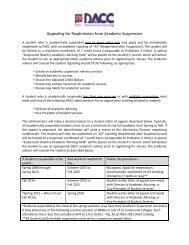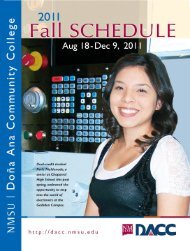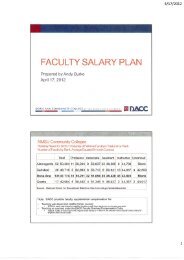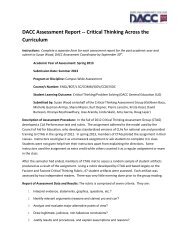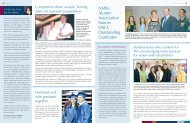DACC Catalog - Dona Ana Community College - New Mexico State ...
DACC Catalog - Dona Ana Community College - New Mexico State ...
DACC Catalog - Dona Ana Community College - New Mexico State ...
You also want an ePaper? Increase the reach of your titles
YUMPU automatically turns print PDFs into web optimized ePapers that Google loves.
72 Doña <strong>Ana</strong> <strong>Community</strong> <strong>College</strong>Health Occupations program in the Division of Health and Public Services.The program director will also be able to advise students regardingchoices for elective courses.NOTE: The Associate Degree in Public Health may be obtained entirely online.Associate Degree (67 credits)Core Requirements—Area I: Communications10 creditsengl 111g Rhetoric and Composition 4engl 218g Technical and Scientific Communication 3comm 253g Public Speaking3or comm 265g Principles of Human CommunicationCore Requirements—Area II: Mathematics3 creditsmath 120 Intermediate Algebra 3Core Requirements—Area III: Laboratory SciencesSelect two courses, each appearing on different lines:ASTR 105G or 110GBIOL 101G+GL or 111G+GLCHEM 110G or 111GGEOL 111G or 212GPHYS 110G or 211G+GL8 creditsCore Requirements—AREA IV: Social/Behavioral Sciences 9 creditsHL S 150g Personal Health and Wellness 3psy 201g Introduction to Psychology 3soc 101g Introductory Sociology 3Core Requirements—AREA V: Humanities and Fine Arts 6 creditsFine Arts: ART 101G, 110G; ENGL 244G; MUS 101G, 201G; or 3THTR 101GHistory: HIST 101G, 102G, 201G, 202G, 211G, 212G, or 221G 3Related Requirements15 creditsoecs 105 Introduction to Microcomputer Technology 3ororc sbcis110110gComputer LiteracyIntro. to Computerized Information SystemsElectives from any of the following categories:12• AHS 120, 155, 202• C EP 110G• HNDS 163, 251Technical Requirements16 creditsNOTE: The CHSS and HL S courses listed here may be applied toward the bachelor’sdegree program in <strong>Community</strong> Health at NMSU.chss 101 Overview of Health and <strong>Community</strong> Services 3chss 216 Ethical and Research Issues in Human and 3<strong>Community</strong> Serviceschss 299 Service Learning Experience in Human and 3<strong>Community</strong> ServicesHL S 100 Introduction to Health Science 1hl s 275 Foundations of Health Education 3hl s 295 Foundations of Public Health, Epidemiology,and Biostatistics38Radiologic TechnologyAssociate Degree: Radiologic Technology(575) 527-7581Radiologic Technologists are an important part of the medical team. They producemedical images (x-rays), carry out diagnostic procedures, determine saferadiation exposure limits, and collect technical data necessary to assess client(patient) status. Job prospects in the Las Cruces/El Paso area are occasionallylimited, but nationwide there is faster-than-average job growth with many opportunitiesfor persons seeking entry-level positions.Students in the Radiologic Technology program receive training both in theclassroom and in clinical settings, where they work alongside nurses, physicians,and other health-care professionals. In the classroom, students learnabout the anatomy and function of the human body, radiographic physics andequipment, and radiographic procedures. Students acquire skills in radiationprotection for the patient and for the health professional. Laboratory activitiesteach the proper positioning of an injured or ill patient. Clinical work offersstudents training in diagnostic radiology and introduces the student tovarious other imaging modalities. The clinical work is offered in Las Cruces,Alamogordo, Artesia, Carlsbad, Deming, Ruidoso, Silver City, and El Paso.Graduates of the program are eligible to take (and must pass) the AmericanRegistry of Radiologic Technologists (ARRT) national certification exam inorder to obtain employment in this field. It should be noted that felony ormisdemeanor convictions may make a student ineligible to take the ARRTexam. Many states also require a license to practice as a radiographer inthat state. Continuing education is required with both the ARRT and statelicenses to retain current certification status.The <strong>DACC</strong> Radiologic Technology program is fully accredited by the JointReview Committee on Education in Radiologic Technology.Special Admissions CriteriaRadiologic Technology is a limited-entry program. Prior to applying to theprogram, students will have taken all program Core and Related Requirements.The following items are among the criteria considered in the selectionof program applicants:• Overall college GPA• GPA in Core and Related Requirements courses• County of residence• Completion of advanced science or math courses• Second or third application with a 3.45 GPAA complete list is included in the application packet, available at the Healthand Public Services Office in room DAHL-190 (phone: 527-7630).Required Skills and AbilitiesStudents should be able to demonstrate good oral expression (speech clarity),written comprehension, near vision, critical thinking skills, and physicalstamina (e.g., the ability to stand for long periods of time, manipulateradiographic equipment, and move/lift patients).<strong>DACC</strong> Radiologic Technology MissionThe mission of the <strong>DACC</strong> Radiologic Technology Program is to provide thestudent with the academic knowledge and clinical skills necessary to attaineligibility for certification and meaningful employment in the diagnosticimaging profession.NOTE: Students in the Radiologic Technology program are required to completeand pass a security background check, FBI fingerprinting, and drugscan in order to participate in clinical education classes. Past criminal violationsmay prevent a student from completing the degree and gaining employmentin the field.



